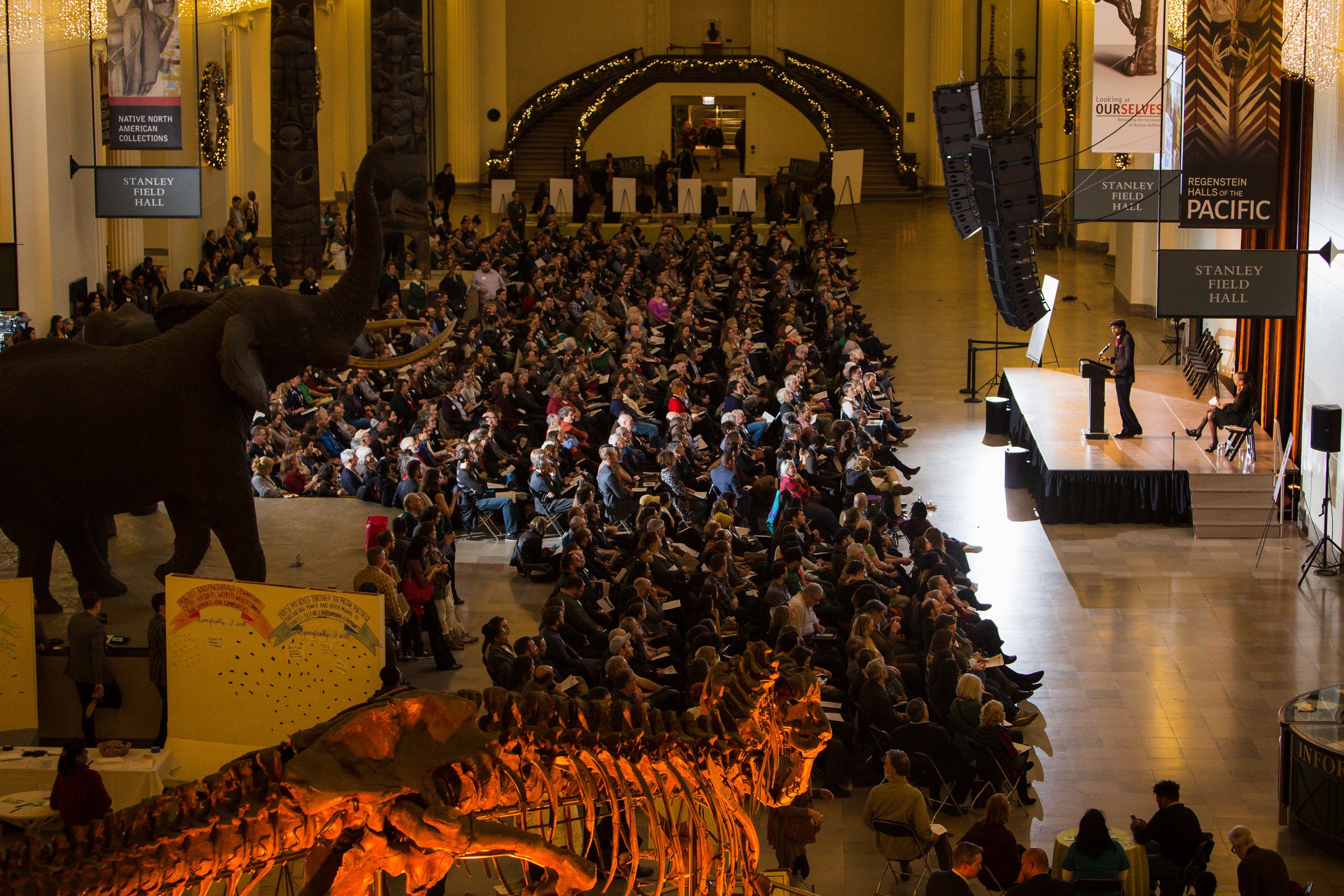Keynote speaker Mustafa Santiago Ali at the Chicago Community Climate Forum.
Chicago Community Climate Forum | The Field Museum | ©Spoon Photo & Design 2017
Dallas Goldtooth, an activist with the Indigenous Environmental Network who helped stop the Keystone XL pipeline, is still advocating for sustained demonstrations and non-violent actions.
“We need a story of change…of resistance,” he told a gathering of close to 1,500 civic leaders, community members, and representatives from 70 civic and environmental organizations that attended the Chicago Community Climate Forum, held Dec. 3 at The Field Museum.
The centerpiece of the forum was the unveiling of a Chicago Agreement on Climate and Community. The agreement outlines a set of principles and commitments by the city’s neighborhoods, institutions, and organizations to curb climate change. Just as the Paris Agreement facilitates collaboration among nations of the world, the Chicago Agreement offers a way for community members and local organizations to contribute to practical climate solutions.
Members of the Green Community Connections/One Earth Film Festival leadership team helped conceive and plan the Climate Forum, which took place on the eve of the North American Climate Summit organized by the Global Covenant of Mayors for Climate Change and Energy. Mayors from around the world convened in Chicago Dec. 4-5 to discuss municipal commitments to the Paris Agreement to curb climate change.
A call to action
The forum was, in part, a response by Chicago environmental advocates to plans by the U.S. to withdraw from the Paris Agreement. They decided to mobilize and convene discussions for taking local action. Planners spent about seven weeks pulling together funders, speakers and a guest list. When RSVPs surged beyond expectations, the planning team had to request a larger space within the cavernous museum.
Generous support for the forum came from the John D. and Catherine T. MacArthur Foundation. Based in Chicago, MacArthur is one of the nation's largest independent foundations. Since 2014, the foundation has made $200 million in grants to accelerate climate response and bring new voices to the fore.
In opening remarks, Julia Stasch, MacArthur president, said cities, like Chicago, are on the front lines of climate action. “Cities represent climate vulnerability, but also opportunity,” Stasch said, noting that 54 percent of the world's population lives in cities.
“There's a myth that we're safe because we live in the Midwest,” she continued. “No hurricanes, forest fires … But our economic productivity is threatened. Chicago is the 6th worst city in the U.S. for allergy impacts due to ozone.”
In his remarks, Chris Wheat, chief sustainability officer for the City of Chicago, referenced climate change’s “disproportionate impact on certain communities” and the need for intersectionality when creating policy.
Newspaper columnist, political analyst and Field Museum trustee Laura Washington was the evening’s mistress of ceremonies.
People power
Keynote speaker Mustafa Santiago Ali, a former senior adviser at the Environmental Protection Agency, who now serves with the Hip Hop Caucus, delivered part pep talk and a rallying cry, telling the crowd: "It's time to get focused to make necessary change. If we win on climate, we must also address the most vulnerable communities." Quoting his grandmother, Martin Luther King Jr. and others, Ali ended his remarks by asking audience members to hold up their hands and yell, “Power! We have power unless we give it away.”
Following Ali, who has trained more than 4,000 people across the country in environmental justice techniques, was a panel comprised of local environmental activists, including Goldtooth.
One of the panelists, Anthena Gore, a project coordinator with Elevate Energy, shared a painful and personal story centered on environmental justice issues. She recounted being diagnosed with lead poisoning when she was 2 years old and how her family dealt with the expensive hospital bills. Gore finished by asking: "Who is the two year old you are trying to reach today?"
The youth dance and spoken word ensemble Kuumba Lynx ended the program with a performance of their “Black B4 Green” production, a powerful commentary on racial and environmental injustice. The program also included a short video featuring voice from a cross-section of Chicago’s environmental activism community.
A reception featuring food and music rounded out the evening, with interactive “Co-Lab” (collaborative) spaces set up that fostered dialogue, learning and networking, along with tools and resources to help people start taking action on climate change.
In all, a festive air characterized the event, even focused as it was on the serious issue of climate change.
Laura Derks explains duties to 'Co-Lab' volunteers.
Laura Derks, a member of the Green Community Connections/One Earth Film Festival’s Core Team, had spent many hours helping plan the forum. As she surveyed the crowd of over 1,000, she reflected that the intensive work of creating such an unprecedented event was worth it.
“Helping a group of 75 volunteers staff the ‘Co-Lab’ space, where attendees could connect, discuss, and plan, during the Chicago Community Climate Forum at The Field Museum was exhilarating,” she said. “The enthusiasm of the volunteers, the energy of the attendees, and voices of the program participants filled the massive Stanley Field Hall and offered promise to future collaboration on affecting climate change at the grassroots level.”
—Cassandra West



